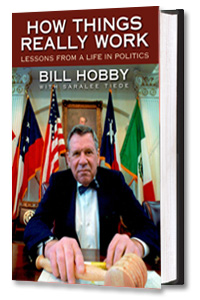Is not voting a civic sin or a rational decision? Is low voter turnout an indication of apathy–or satisfaction? There’s more than one view about those questions.
Only about nine per cent of Texas voters came out last November 4, despite such interesting issues on the ballot as the Houston ban on affirmative action and the amendment allowing us to borrow against our homes.
We have devoted a great deal of energy in this country to making it simple and convenient to vote. We have made up for the elitist past. Our founding fathers thought only white male landed gentry should vote. We have made up for our sexist past. Texas passed its own women’s suffrage amendment before the feds did– when my father was governor. We have tried to make up for our racist past. Poll taxes and literacy tests are no longer necessary to register for voting. We have lowered the voting age from 21 to 18.
Felons are the only adults who can’t vote now. But every time we expand the electorate voter participation, measured by percentage turnout, goes down.
It’s easy to vote.
There are voter registration postcards in post offices, libraries and state offices. You can get an application on-line by pulling up the Secretary of State’s website (www.sos.state.tx.us) Mail it in, and within 30 days, you’re eligible to vote. You can vote at the grocery store or shopping mall. There is lots of time to get it done. Polls are open for nearly three weeks before the election, in addition to election day. County commissioners may set up early voting places all over, and must have at least one per commissioners’ precinct.
Texas has tried to create knowledgeable, responsible voters by starting with children in the public schools. Project V.O. T.E., an excellent project of Secretary of State Antonio Garza, has instruction in 38 school districts, including Houston and Klein. This pre-kindergarten through high school program teaches the relationship between democracy and decision-making.
None of these efforts has increased voter turnout. So, if you don’t vote are you mad? Apathetic? Alienated?
Two political scientists in Houston don’t think so: Bob Stein, Dean of Social Sciences at Rice University, and Dick Murray, director of the Center for Public Policy at the University of Houston.
They believe that not voting is a reflection of an effective, efficient and satisfactory system of governance.
According to the Stein-Murray hypothesis, some individuals participate in the political process because they have a specific need that some level of government can fulfill-they want the potholes repaired so they vote for a city council candidate. They’re concerned about the economy so they replace President Bush with President Clinton.
Most people do not participate at all levels of government because they don’t see all government as relevant to their needs at the moment. Those who do participate are thought to be sufficiently interested and engaged to become informed and make rational choices among candidates.
When you try to increase turnout and bring in people without a strong interest in the business of government, you get random voting–not necessarily a good thing.
Stein and Murray point out that while only a third of eligible voters participate in any election, about 90 percent of voters ballot in at least one election during a four-year presidential cycle. People vote where they think it’s important to fix a problem or fulfill a need.
So far, they say, studies of non-voters and voters fail to confirm that non-voters are apathetic, alienated from government, or more dissatisfied with government than voters.
The Murray-Stein hypothesis makes good sense. We don’t repair the car when it’s not broken. We don’t run to the polls when we don’t see big problems with government. If it ain’t broke, don’t fix it.
We waste a lot of time telling people what they need to do, forgetting that the American public uses very good judgment most of the time. It wasn’t the Wall Street experts who saved stock prices a few weeks ago. They were busy panicking something happening in Hong Kong. We owe our strong stock market to sensible Main Street investors. They didn’t think it was broke.

